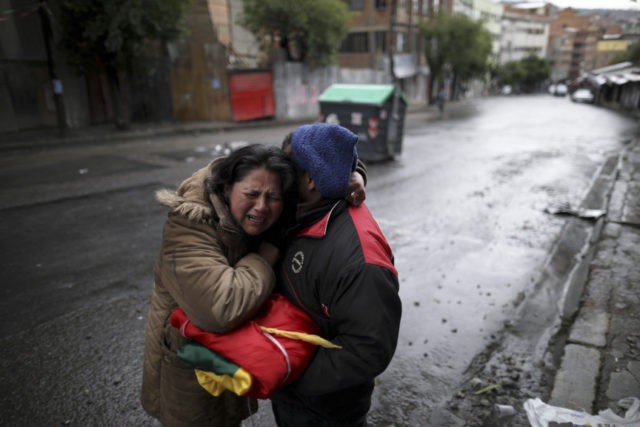LA PAZ, Bolivia (AP) — The latest on the political crisis in Bolivia (all times local):
11:15 a.m.
The European Union is calling for calm in Bolivia and says it stands ready to send election observers to monitor any new polls if a request is made.
EU foreign policy chief Federica Mogherini says the bloc’s foreign ministers weighed Monday whether to send a monitoring team and agreed that “if the conditions are right, we will be ready to work on it.”
Mogherini says the EU hopes that credible elections can be held soon “most importantly, avoiding any form of violence from any side, and showing a level of statesmanship that is needed in this moment.”
Former Bolivian President Evo Morales resigned on Sunday following weeks of protests and a call from the military for him to quit. His departure left a power vacuum in the country.
—By Lorne Cook in Brussels.
___
10:55 a.m.
Bolivian opposition leader Carlos Mesa says former President Evo Morales was brought down by a popular uprising, not the military.
Mesa’s comments on Monday were part of a growing dispute over whether Morales’ resignation on Sunday was the result of a military coup.
Mesa says there was no coup and that the military had made a decision not to deploy in the streets because “they didn’t want to take lives.”
Bolivia’s military chief had said on national television that Morales should resign so that order could be restored following a disputed election. Morales did so soon afterward.
___
10:30 a.m.
Former Bolivian President Evo Morales is lashing out at his opponents on social media.
Morales on Monday tweeted that opposition leaders Carlos Mesa and Luis Fernando Camacho had instigated a coup against him.
Opponents “lie and try to blame us for the chaos and violence that they provoked,” Morales said.
Bolivia’s first indigenous president resigned on Sunday after the military called for him to quit, and following weeks of protests since a disputed election.
The state news agency ABI said Morales announced his resignation from Chapare province, where he began his career as a union leader.
___
10 a.m.
Mexico is describing the ouster of former Bolivian President Evo Morales as a military coup.
Marcelo Ebrard, the Mexican foreign minister, said Monday that the Bolivian military’s call for Morales to resign had violated “the constitutional order” in Bolivia.
Ebrard says Mexico still considers Morales to be the legitimate leader of Bolivia and that the Organization of American States should hold an emergency meeting to discuss the crisis there.
The Mexican foreign minister indicated that Morales, who resigned Sunday, would be welcome to seek asylum in Mexico.
“What happened yesterday is a step back for the whole continent,” Ebrard said. “We’re very worried.”
—By Maria Verza in Mexico City
___
9:50 a.m.
Spanish Foreign Minister Josep Borrell says Spain is worried by the power vacuum in Bolivia following the resignation of President Evo Morales.
Morales was pushed by the military and weeks of massive protests after an Oct. 20 national election was marred by allegations of fraud.
“We are worried because we don’t know who is going to take on this process and because it was the intervention of the army calling on the president to step down that has created this power vacuum,” Borrell told reporters Monday.
Borrell, who takes over as the European Union’s diplomacy boss in December, called for elections to be held in the country as soon as possible and for security to be preserved for all Bolivians, including Morales and his aides.
—By Aritz Parra in Madrid.
___
9:30 a.m.
Angry supporters of former Bolivian President Evo Morales have set up barricades to block roads leading to the country’s main airport.
Smoke billowed from some flaming barricades early Monday as tension gripped La Paz and surrounding areas after Morales resigned.
A large mural near the airport in the city of El Alto read: “Evo: the people need you.”
Morales resigned on Sunday after nearly 14 years in power. He was forced out by the military and weeks of massive protests over a disputed election that he claimed to have won.
—By Luis Andres Henao in La Paz.

COMMENTS
Please let us know if you're having issues with commenting.